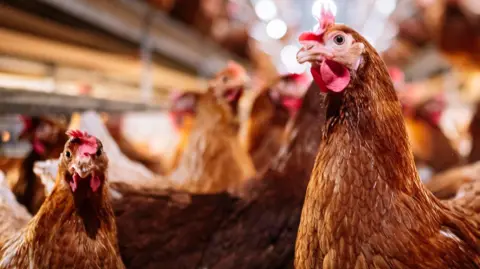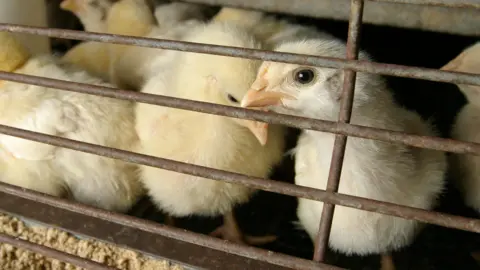Third suspected bird flu case discovered in County Tyrone
 Getty Images
Getty ImagesA third suspected case of bird flu is under investigation in County Tyrone.
It was reported to the Department of Agriculture, Environment and Rural Affairs (Daera) on Sunday.
All 32,000 birds at the premises near Cookstown will be humanely destroyed.
It means more than 110,000 birds will have been culled in Northern Ireland due to bird flu in just over 10 days.
Previous suspected cases were discovered at a commercial poultry farm near Dungannon and at a site in Pomeroy - the first findings since December 2021.
'Big hit'
 Reuters
ReutersGlenn Cuddy from the Ulster Farmers' Union said the loss of flocks will have a "big hit" on affected farmers.
"Unfortunately we are where we are," he said.
"The farmers will get some compensation for whatever birds they've lost, but at the end of the day there'll be no production on the farms for maybe six to eight months before they get back and going again."
The poultry sector is worth £600m to the Northern Ireland economy.
Flock owners have been urged to review their biosecurity measures, and a housing order remains in place.
There are more than 600 poultry farms across Northern Ireland, with the majority of them concentrated in the Mid Ulster area.
'Unsurprising'
Divisional Veterinary Officer Ignatius McKeown said it was unsurprising that two instances of the virus had been reported in quick succession and in the same area.
"We were aware that the disease is circulating in wild birds, so that means that all poultry premises are potentially at risk.
"And that is why we've extended the biosecurity rules across Northern Ireland so that everybody is aware that they are at a potential risk."
Bird gatherings have also been banned.
Uncertainty about how long that ban will last has led to the cancellation of poultry competitions at this year's Balmoral Show.
When bird flu is suspected at a farm, the entire flock is culled and any eggs are destroyed.
Preliminary test results are confirmed with further testing at the National Reference Laboratory in Weybridge and the EU's equivalent facility in Italy.
A testing and monitoring regime is put in place when the farm is restocked, and there are strict controls about when any trade may recommence.
'Difficult week'
The Agriculture and Environment Minister Andrew Muir said it had been "a difficult week" for the poultry sector and urged all flock keepers to be alert.
"Biosecurity is the greatest weapon we have to fight Avian Influenza," he said.
"It is crucial that all bird keepers adhere to stringent biosecurity measures to protect their flock and report any suspicious cases immediately.
"I strongly encourage all bird keepers to familiarise themselves with the guidance provided by my Department."
On claims of egg shortages, he added "that is categorically not the case".
"A small percentage of farms have been affected by AI and the supply of eggs and poultry meat remains high and close to usual levels."
The preliminary test results will be assessed by the Daera's UK National Reference Laboratory and the EU's equivalent in Italy.
